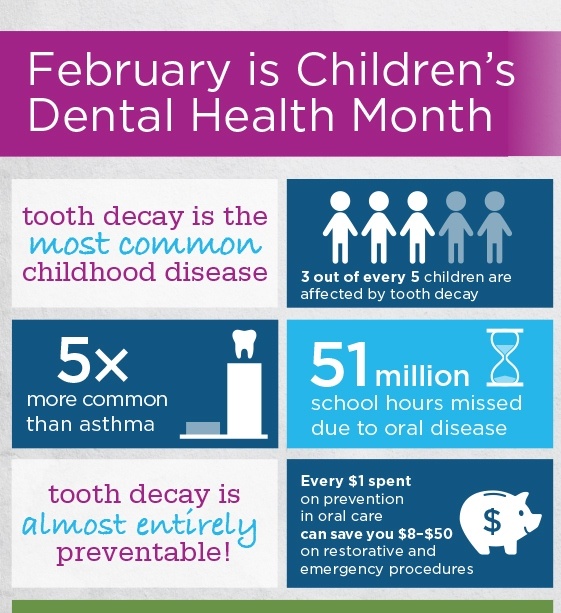Did you know that three in five children have had cavities? Did you know that every year 51 million hours of school are missed due to oral disease? February is National Children’s Dental Health Month and we at Smiles4Kids want to help make sure your children stay cavity free. Cavities are entirely preventable with some key knowledge and some easy regular steps!
- Regular Dental Exams
Cavities progress in baby teeth faster than they do in adult teeth, so it’s especially important to have your kids in for a dental exam every six months. During your 6-month exam, the dentist evaluates the teeth for signs of early cavities. Diagnosing cavities early is key, because at early stages cavities are actually REVERSIBLE. Also, as a contagious infection, we often see cavities spread to other teeth in the mouth. At your exam, we will review with you your personalized prevention and treatment plan based on your particular lifestyle and kid’s personalities. - Appropriately Spaced X-Rays
Here at Smiles4Kids we are very conscious of your children’s health as a whole and believe in the ALARA Principle of timing x-rays. ALARA stands for “As Low As Reasonably Achievable” and means that we take the minimum x-rays needed to accurately care for each child. X-rays are important tools in dental evaluations because they allow us to see between teeth, where the eye cannot. They allow us to determine which cavities are reversible and which need to be treated. They also allow us the ability to monitor some cavities instead of reaching for the drill. Every dentist should be conscious of exposing your child to the least radiation possible and we consciously choose to only recommend the lowest number and frequency of x-rays that your child could need. When used appropriately, the information obtained through x-rays can be crucial in preventing dental treatment. - Low Sugar Diet
More and more research suggests the negative effects of sugar on overall health. Cavities cannot form without sugar in the diet. Dietary sugars are turned into acid by bacteria in the mouth and basically cause the teeth to dissolve. Instead of cookies, chips and candy try non-sugary snacks like string cheese, popcorn, and unsweetened yogurt. While a fruit is a great snack, juice can wash sugar all over the mouth and do real damage to teeth. Stay away from juice (and any liquids other than water) between meals or in bed. - Home Care
We usually see your children two days a year, while you see and live with them another 363 days at home. The care they give their teeth on a regular basis directly determines what we see when they visit the dentist. Brushing two minutes after breakfast and two minutes after dinner with nightly flossing will clean sugars off the teeth and avoid prolonged acid in the mouth. Developing the habit of good supervised care at home is the best prevention possible! - Fluoride
Fluoride can be thought of as the building blocks of teeth. As the teeth begin dissolving from the sugar-turned-acid, fluoride can reverse the process and, in very early cavities, essentially “heal” the teeth. Regular fluoride application at the dentist office can condition teeth to be less vulnerable to these acid attacks. New York City tap water has fluoride, as do many foods today. Most importantly, fluoride toothpaste should be used every morning and night after six months of age. A smear until age three and then a pea size amount as children learn to spit. - Sealants
The back teeth have bumps on their biting surfaces to help grind food. Unfortunately, these bumps come together to form grooves in the teeth, where food often gets wedged. Most of kid’s cavities form in these areas. To help avoid this we recommend sealants on all permanent molars. Sealants are done in one visit, in which a white liquid is painted into the grooves and hardened with a light. This painless procedure essentially seals these grooves and protects them from food impaction – thus protecting them from cavities. Brushing and flossing is still needed, but sealants can reduce cavities on these vulnerable surfaces by up to 80%!
Overall, these are just some of the many preventative steps you can take to avoid cavities in your children’s teeth. Every child is unique and continuously growing and changing. Through different stages of life children develop new dietary and care habits while also becoming increasingly independent. We are always here to help guide your children’s oral health through those stages and look forward to helping them stay cavity free!

